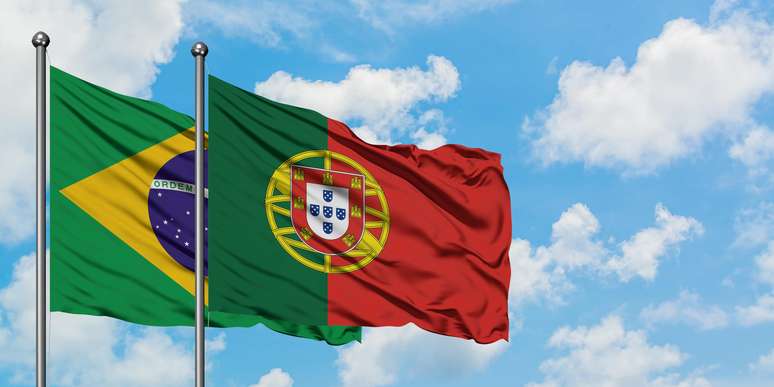The strength of the variant spoken by Brazilians causes different reactions in Portuguese society
Centuries ago, the Portuguese crossed the seas and expanded the domains of their empire, colonizing Brazil, Macau, Cape Verde and other places. One of the main hallmarks of this era continues to become more alive, pulsating and adaptable every day: the Portuguese language, celebrated this May 5th.
Receive the main news directly on WhatsApp! Subscribe to the Terra channel
In the opposite direction, today it is Brazilians, descendants of the former colony, who cross the Atlantic in search of greater opportunities. The numbers are significant: 400,000 documented Brazilians live in Portugal, representing 40% of the foreign population in the country, according to 2023 data from the Foreigners and Borders Service (SEF).
The Brazilian presence in Portuguese lands, added to the strength of the cultural impact that Brazil has on other Portuguese-speaking countries, with soap operas, music, literature and digital influencers, makes the Brazilian language increasingly “popular”. There is no shortage of reports of Portuguese people being “scared” by the use of “Brazilian” on Portuguese soil: this is how they refer to the Portuguese spoken in Brazil.
Post-doctoral in Applied Linguistics and professor at PUC-SP, Neusa Barbosa Bastos reminds us that language changes and fighting it is a losing battle.
“Latin has been changed in several Romance languages, as well as in other languages. There is no point in trying to stop this, because these changes are constant and gradual. It is the people who change the language. Therefore, saying that European Portuguese is pure it is inadequate, there is no purity. We are a mixture of races, of people and these groups were altering our language in a new way,” he says.
An ocean of differences
A dialogue with a Portuguese person or the subtitles of a film in European Portuguese are enough for the differences between Brazilian Portuguese and the Portuguese spoken on Portuguese soil to become evident. This happens in different orders: orthographic, phonological, morphosyntactic and, perhaps, the one that causes the most unusual situations, the lexical difference, when the same words or expressions have different meanings.
‘Bicha’ loses its negative connotation and simply becomes ‘queue’ in Portugal. “Bala” becomes “candy,” “bath” becomes “bath,” and so on.
In the speech, further changes.
“The stressed syllables are very marked in European Portuguese and this does not happen in Brazilian Portuguese. In general, we tend to give a more similar amount of force, there is not such a marked difference”, explains Valquíria Carvalho, doctor of Linguistics and professor of PUC-MG.
In general, Brazilian Portuguese has a more rhythmic speech, with more evidence in the pronunciation of vowels. European Portuguese, on the other hand, tends to “eat” unstressed vowels and speak faster.
Other differences deserve to be highlighted:
- Proclisis or eclipse?
In Brazilian Portuguese, the pronoun comes before the verb (proclisis). In European Portuguese, the pronoun occurs after the verb (enclisis).
PT-PT: Tell me what to do / lend me your pen / give me a piece of bread
PT-BR: Tell me what to do / lend me your pen / give me a piece of bread
- Use of the gerund
The gerund (when verbs end in ndo) indicate an action in progress. In Brazil it is used frequently, in speech or writing. In Portugal it is preferred to use the a + the infinitive verb.
PT-PT: I’m walking / I’m talking / Are you waking up?
PT-BR: I’m walking / I’m talking / Are you waking up?
-
Use of you/you
In general, the use of You in Brazil it is more common in the far south of the country and in some northern regions. However, it tends to mix between the grammatical second and third person. An example would be the sentence: “Will you travel tomorrow?“. The verb go appears conjugated in the third person (vai), but, according to educated Portuguese, the correct option would be “vais” (second person) or changing the pronoun to “Você”.
In Brazil, “tu” is used informally. Neusa explains that, in European Portuguese, “tu” is used in informal treatment between people.
“For them, ‘you’ indicates a distance, it’s a more formal form,” he adds.

Sweet, cool or pica: what do these words mean in Portugal?
After all, why are we different?
What makes Brazilian Portuguese different from European Portuguese is precisely the process of formation of Brazil. Portuguese has been strongly influenced by indigenous languages, languages of African origin and also by other languages brought by other immigrants (Italians, Japanese, Arabs, etc.).
“We have this huge distance, an ocean between us, and we have the influence of indigenous languages, as well as languages of African origin, mainly of Bantu origin, which have left very characteristic marks in our language. These influences have shaped Brazilian Portuguese” , explains Valkyrie.
Furthermore, the expert points out that Portuguese actually began to be spoken in Brazil in the 18th century, when gold was found in Minas Gerais. Thus, more and more Portuguese arrived in the country.
“Before that there were general languages of indigenous origin,” he adds.
Another important aspect is the independence of Brazil, which occurred in 1822, which led to a decrease in the ‘presence of the colonizer’. This would help explain why the Portuguese of Mozambique and Angola, for example, are closer to the European Portuguese.
“We were colonized from 1500 to 1822. We were 153 years ahead of these other countries, which had their independence process in 1975. They were 153 [a mais] so that Portuguese develops in Brazil”, concludes Neusa.
Source: Terra
Rose James is a Gossipify movie and series reviewer known for her in-depth analysis and unique perspective on the latest releases. With a background in film studies, she provides engaging and informative reviews, and keeps readers up to date with industry trends and emerging talents.



![Un Si Grand Soleil Preview: Episode Summary for Monday, October 27, 2025 [SPOILERS] Un Si Grand Soleil Preview: Episode Summary for Monday, October 27, 2025 [SPOILERS]](https://fr.web.img4.acsta.net/img/16/ec/16ecdc89ab22d2242ca3490a29003c5c.jpg)


